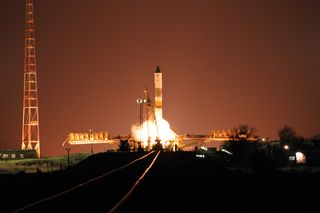Robotic Russian Cargo Ship Headed for Space Station

An unmanned Russian cargo ship is headed for the International Space Station to deliver three tons of supplies to the outpost's crew, including a tiny satellite and birthday gifts for the orbiting lab's commander.
The automated Progress 41 space freighter blasted off from the Central Asian spaceport of Baikonur Cosmodrome in Kazakhstan 8:32 p.m. EST yesterday (Jan. 27), though it was 4:32 a.m. Moscow Time (0132 GMT) on Jan. 28 at the time of liftoff.
Progress 41, also known as Progress M-09M at Russia's Federal Space Agency, will arrive at the International Space Station Saturday at 9:40 p.m. EST (0240 Jan. 30 GMT), though it will be 5:40 a.m. Sunday Moscow time.
There's a wealth of goodies packed aboard the Progress 41 spacecraft for the space station's six-person crew. The station is currently home to four Russians, two Americans and one Italian astronaut.
In addition to fuel, oxygen and books, the spacecraft is carrying birthday gifts for the space station's commander — American astronaut Scott Kelly — who will celebrate his 47th birthday in space on Feb. 21.
The miniature Earth Artificial Satellite "Kedr" is also aboard Progress 41. It weighs a mere 66 pounds (30 kilograms) and is packed in a box about 22 inches (550 millimeters) per side. The name "Kedr" comes from the call sign used by the first person to fly in space, Yuri Gagarin, who made the historic first human spaceflight nearly 50 years ago on April 12, 1961.
Also known as RadioSkaf-V in Russia and ARISSAT-1 in the United States, the tiny satellite is part of an amateur radio experiment by the Radio Amateur Satellite Corp., NASA and the Russian aerospace company RSC Energia.
Get the Space.com Newsletter
Breaking space news, the latest updates on rocket launches, skywatching events and more!
"It will transmit its signal at 145.95 MHz, with the amateur radio call sign is RS1S," Russia's Federal Space Agency officials said in a statement.
The satellite, which will be tossed overboard by Russian cosmonauts during a spacewalk set for Feb. 16, is designed to transmit 25 greeting messages in 15 different languages, as well as photos of Earth and telemetry, officials with Russia's Federal Space Agency said.
About 1,918 pounds (870 kg) of propellant for maneuvering thrusters, 110 pounds (50 kg) of oxygen, 926 pounds (420 kg) of water, and 3,080 pounds (1,400 kg) of dry cargo are also being ferried to the space station on Progress 41, NASA officials have said.
The docking of Progress 41 comes just after the arrival of another cargo ship at the space station — Japan's robotic Kounotori 2 space freighter — which hooked up to the station early Thursday (Jan. 27).
Yet another cargo ship, this one built by the European Space Agency, is due to be launched toward the space station on Feb. 15 ahead of NASA's next shuttle mission on the shuttle Discovery, which will blast off Feb. 24 for the same destination.
Russia's 24-foot (7.3-meter) Progress spacecraft are similar in appearance to the three-module Soyuz space taxis that ferry cosmonauts and astronauts to and from the space station.
Both vehicles have a propulsion and orbital module; however, Progress vehicles do not have a crew-carrying module like the Soyuz ships. Instead, Progress vehicles are equipped with a propellant module to store fuel for the space station's maneuvering thrusters.
You can follow SPACE.com Managing Editor Tariq Malik on Twitter @TariqJMalik. NASA will broadcast the docking of Progress 41 live on NASA TV beginning at 9 p.m. ET
Join our Space Forums to keep talking space on the latest missions, night sky and more! And if you have a news tip, correction or comment, let us know at: community@space.com.

Tariq is the Editor-in-Chief of Space.com and joined the team in 2001, first as an intern and staff writer, and later as an editor. He covers human spaceflight, exploration and space science, as well as skywatching and entertainment. He became Space.com's Managing Editor in 2009 and Editor-in-Chief in 2019. Before joining Space.com, Tariq was a staff reporter for The Los Angeles Times covering education and city beats in La Habra, Fullerton and Huntington Beach. In October 2022, Tariq received the Harry Kolcum Award for excellence in space reporting from the National Space Club Florida Committee. He is also an Eagle Scout (yes, he has the Space Exploration merit badge) and went to Space Camp four times as a kid and a fifth time as an adult. He has journalism degrees from the University of Southern California and New York University. You can find Tariq at Space.com and as the co-host to the This Week In Space podcast with space historian Rod Pyle on the TWiT network. To see his latest project, you can follow Tariq on Twitter @tariqjmalik.
